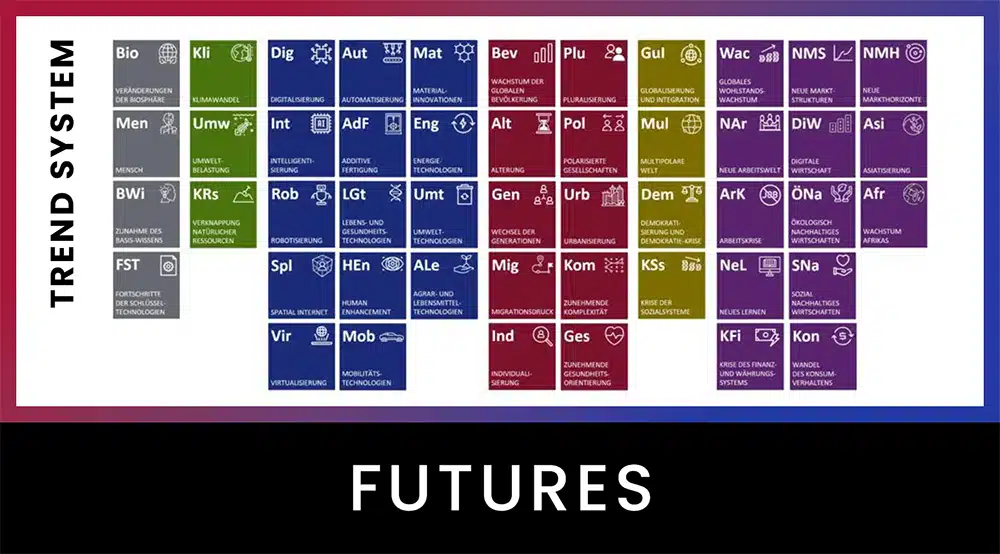First solve the problem before the problem
If “no time for the future and strategy” is really your problem, then you need to solve this problem first and foremost. It’s easy in terms of content. It’s more of a psychological challenge.
Without room for the future and strategy , risks grow and opportunities shrink
You can have as many ideas and inspiration as you like, but if you don’t have time to use them for your business, they will make you more dissatisfied.
Developing your company’s vision and strategy for the future and making it effective within the team is your only non-delegable task. It is also the most profitable use of your time. But there is a lack of time. And often the energy too.
In the following, I recommend the most effective and simplest measures you can take to create more space for your future and strategy.
You can either read the text or watch the six short videos.
The most important things first in the long term
You may know the following story. Stephen Covey, among others, tells it in his book “First things First”, but the actual author is unknown.
Your day, your week and your time and energy in general is like a bowl. Your activities are like stones, pebbles and sand with which you fill the bowl. The big stones are the important activities. With sand and gravel, the bowl fills up all by itself. The eternal flow of e-mails alone ensures this. And in no time at all, the bowl is full and you can’t put any more large stones in it.
However, the large stones will give you the greatest success and ultimately the least stress. You must place the large stones in the bowl first. You have to claim, reserve and defend the space for them first. Then you will be successful.
If you don’t do this, your day and your life will be filled with the small and unimportant. An unproductive day consists of 90% or more long-term unimportant activities. A productive day consists of at least 50% of the most important activities that will later be important for your life and business.
Blocking time for the future
Depending on the study, up to 96% of managers cite a lack of time as the most important bottleneck for better future strategies. There are simple solutions.
If it is true that future strategy and leadership are the only tasks that cannot be delegated, then as an entrepreneur and manager you should have nothing else on your agenda.
Theoretically. At least 80%. Right? I know from my own experience that this is an unattainable dream. At least not if you work in your company at all. That would practically only be possible as a pure investor.
What I’m doing here at the moment is also more operational work. We can manage 50%. At least 20%. We have to make that possible. 20%, one day in a five-day week or just a little more than one day in a six-day week. If you’ve already got that far, then congratulations.
If not, I dare say that first and foremost, your most important and profitable task is to block that 20% of your working time for the most important things. It’s not a new idea at all. Even Benjamin Franklin is said to have practiced time blocking. Elon Musk also does it in order to have time for his many companies, especially Tesla and SpaceX.
One more tip. Most people understand time blocking to mean that you organize your day in such a way that all tasks to be completed have a time period. That’s basically true, but that’s not what I’m talking about here. This is all about time for the future and strategy.
What are the benefits of time blocking for the future and strategy?
1. Time for the future and strategy will drastically increase your productivity.
a. Because you are not disturbed or distracted as much or at all. And can therefore work in depth on the most important things.
b. Because tasks always fill the time available. One of Parkinson’s laws. You will achieve more in the budgeted time than if you tackle the future and strategy from time to time and there is no end date in one day.
2. Time for the future prevents you from postponing work on the future of your company again and again, because by its very nature it is complex and often exhausting work. People like to postpone such tasks. Even the most intelligent people do this. In fact, they often do it because they can visualize the complexity of the task much better than less intelligent people. This is why particularly intelligent people procrastinate even more than others.
How do you practically block out this time? When paper calendars were still common, it would have been a good practice to simply tear out a page from each week for one day. Then no appointment could possibly be entered on these days.
With an electronic calendar, the equivalent is that you enter a fixed appointment for a whole day once a week, from seven in the morning to eight in the evening. It’s best to make a series of appointments.
Which day you choose is largely irrelevant. If you don’t limit yourself to five working days, Saturday is definitely recommended, simply because there is less day-to-day business. There are pros and cons for each day. Monday and Friday extend your distance from the day-to-day business, but it could make you feel guilty if your employees notice that you come back later from the weekend and go in earlier. Wednesday would be good because it splits your working week in half for operational matters. As I said, it doesn’t really matter which day you choose. Two half days are also possible, but it is much more effective if you have a full working day without interruption, a full future day.
As I said, it’s not a new idea, but it’s a prerequisite for working on the future of your company and making it more future-proof. Block at least 20% of your time for working on the future of your company.
Making time for the future in the team
It’s easy to block time for the future. Set a date, set a regular date, save, done. But keeping to this time, enforcing it, that’s the real challenge.
Appointments and tasks for your day-to-day business are constantly landing in your calendar. The priorities of your employees and customers determine your days. There are hardly any consecutive hours in which you can work on your future strategy in peace. How are you supposed to have time for the future and strategy under these circumstances?
You have two “opponents”: your employees. And yourself.
Make it clear to your employees that this blocked appointment is sacred and untouchable. You will always get questions as to whether the appointment is really fixed, whether a customer meeting can be booked because there is nothing else free.
Therefore: Your instructions must also include that you don’t even want to be asked whether an appointment in your future time is possible. So that you are not tempted to become weak. So that you don’t get a guilty conscience. You shouldn’t even find out that there are appointment requests for your future time. Don’t worry, your employees will get used to it.
Appoint an accountability partner
How can you reliably get yourself to keep and use your future time?
Use an “accountability partner”, an accountability partner. This is a person who helps you to achieve a goal you have set yourself.
An accountability partner can be useful for many projects. Losing weight, implementing a project, breaking a habit or, as in this case, keeping your future time.
Your accountability partner can be a coworker, a friend, your life partner or even a dedicated coach. In any case, it must be someone you don’t want to disappoint and whose opinion of you is important to you.
There must also be a person who takes their role seriously and can and may express their displeasure, who may exert pressure if you do not do and achieve what you have set out to do and promised them. Accountability partnerships are demonstrably effective. It has been proven in several studies.
He or she can support you to varying degrees:
- By having your partner remind you regularly, which is of course more effective than having software remind you
- By agreeing that you will give your partner a regular report on how things are going
- By also checking you and keeping a tally of how often you succeeded and how often you didn’t
- By making a bet with the accountability partner and having to pay something if you don’t meet your future deadline
- By having your back, i.e. defending your time against others.
Accountability partners can support each other. This should work well among your employees. However, I would advise you not to support each other in this case. Your accountability partner must not run the risk of failing themselves, otherwise their authority will be weakened and it won’t work.
Creating a place for the future
When you are in your office, you are most likely not to be able to enforce your future time.
Please consider and decide whether you need your office for your future work. I myself have the best technical equipment in my office. I can work less well in my home office or on the road. At least for operational work. But I don’t need anything more than my notebook to think freely about the future.
No, the notorious white sheet of paper is not my cup of tea. I have always found paper to be highly inefficient. It’s even been empirically proven. But everyone can handle it however they like.
Find a place, or even several places, where you feel very comfortable and which makes it easy for you to think big and carefully in peace. It is a form of self-isolation.
Possible locations include your home office if you have peace and quiet there, a hotel, a mobile office, a boat, an allotment garden, a vacation apartment or a second small office just for you.
Your place for the future can not only provide you with peace and quiet and self-isolation, but can also offer special inspiration. For example, a co-working space with lots of small creative companies and young people. Or a colorful neighborhood or an artists’ colony.






























